|
|
|
Sort Order |
|
|
|
Items / Page
|
|
|
|
|
|
|
| Srl | Item |
| 1 |
ID:
144199


|
|
|
|
|
| Summary/Abstract |
The Internet's original design provided a modicum of privacy for users; it was not always possible to determine where a device was or who was using it. But a combination of changes, including “free” Internet services, increasing use of mobile devices to access the network, and the coming “Internet of Things” (sensors everywhere) make surveillance much easier to achieve and privacy more difficult to protect. Yet there are also technologies that enable communications privacy, including address anonymizers and encryption. Use of such technologies complicate law-enforcement and national-security communications surveillance, but do not completely block it. Privacy versus surveillance in Internet communications can be viewed as a complex set of economic tradeoffs–for example, obtaining free services in exchange for a loss of privacy; and protecting communications in exchange for a more expensive, and thus less frequently used, set of government investigative techniques–and choices abound.
|
|
|
|
|
|
|
|
|
|
|
|
|
|
|
|
| 2 |
ID:
108863
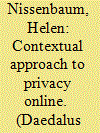

|
|
|
|
|
| Publication |
2011.
|
| Summary/Abstract |
Recent media revelations have demonstrated the extent of third-party tracking and monitoring online, much of it spurred by data aggregation, profiling, and selective targeting. How to protect privacy online is a frequent question in public discourse and has reignited the interest of government actors. In the United States, notice-and-consent remains the fallback approach in online privacy policies, despite its weaknesses. This essay presents an alternative approach, rooted in the theory of contextual integrity. Proposals to improve and fortify notice-and-consent, such as clearer privacy policies and fairer information practices, will not overcome a fundamental flaw in the model, namely, its assumption that individuals can understand all facts relevant to true choice at the moment of pair-wise contracting between individuals and data gatherers. Instead, we must articulate a backdrop of context-specific substantive norms that constrain what information websites can collect, with whom they can share it, and under what conditions it can be shared. In developing this approach, the paper warns that the current bias in conceiving of the Net as a predominantly commercial enterprise seriously limits the privacy agenda.
|
|
|
|
|
|
|
|
|
|
|
|
|
|
|
|
| 3 |
ID:
172109
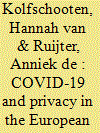

|
|
|
|
|
| Summary/Abstract |
When disease becomes a threat to security, the balance between the need to fight the disease and obligation to protect the rights of individuals often changes. The COVID-19 crisis shows that the need for surveillance poses challenges to the right of privacy. We focus on the European Union (EU), which has a strong data protection regime yet requires its member states to exchange personal data gathered through contact tracing. While public authorities may limit the right to privacy in case of public health threats, the EU provides little guidance when such limitations are proportionate. To define standards, we analyze existing EU case law regarding national security measures. We conclude that on the proportionality of contact tracing in the EU it is difficult to reconcile public health measures and individual rights, but guidance can be taken from understandings of proportionality in the context of security, particularly in the current COVID-19 emergency.
|
|
|
|
|
|
|
|
|
|
|
|
|
|
|
|
| 4 |
ID:
149662
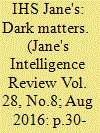

|
|
|
|
|
| Summary/Abstract |
The growth of dark spaces has been a driver for government efforts to regulate state surveillance of online activities. IHS Jane's assesses how the competing interests of security and privacy are influencing the widening debate over surveillance legislation.
|
|
|
|
|
|
|
|
|
|
|
|
|
|
|
|
| 5 |
ID:
130992


|
|
|
|
|
| Publication |
2014.
|
| Summary/Abstract |
How to Engage with the Politics of Privacy in the Age of Preemptive Security? My suggestion is to start with data protection, which, following De Hert and Gutwirth (2006), is not exactly the same of privacy. Extrapolating from their analysis of the two as different "legal tools," I would say that privacy and data protection are two slightly different rationales of power relations: one of privacy based on the "opacity of the individual" and one of data protection on the "transparency and accountability of the powerful" (Gutwirth and De Hert 2008:275; emphasis in original).1 These rationales (attempt to) orientate two different loose dispositifs, each formed by a composite ensemble of elements. Some of these elements are peculiar to each dispositif, while others are shared or encompassed by both
|
|
|
|
|
|
|
|
|
|
|
|
|
|
|
|
| 6 |
ID:
130993
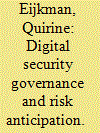

|
|
|
|
|
| Publication |
2014.
|
| Summary/Abstract |
The anticipatory turn in managing security and safety relies not only on innovative technological tools, but also on social practice. New information and communication technology, for instance, facilitates digital security governance1 which entails the collection, processing, storage, and sharing of digital personal data for risk profiling, but little is known about the role of security officials in preemptive security. Although people, or "data subjects," are categorized according to a (predefined) level of potential threat on the basis of digital data, it is often unclear which actor or agency was responsible for this categorization. This is especially unclear when information was shared across the globe between several security agencies and/or private companies. Nonetheless, as the assessment of risk or dangerousness affects someone's real-life opportunities, privacy rights or claims to something or someone are likely to be evoked.
|
|
|
|
|
|
|
|
|
|
|
|
|
|
|
|
| 7 |
ID:
093778


|
|
|
|
|
| Publication |
2009.
|
| Summary/Abstract |
This article explores public concerns about the US Department of Homeland Security's data 'fusion centers'. These centers, which are proliferating across all US states, coordinate data-sharing among state and local police, intelligence agencies, and private companies. The primary goal of fusion centers is to engage in intelligence-sharing for counter-terrorism purposes. However, they have been used for a variety of other purposes, such as basic policing, spying on social movement organizations, or restricting legal public activities such as taking photographs. Drawing upon a comprehensive analysis of media publications from 2002 to 2008, we identify and discuss three primary categories of concern with fusion centers: (1) their ineffectiveness, particularly given the financial expense, the statistical unlikelihood of terrorist attacks, and the pressing need for other law enforcement support; (2) the potential for mission creep, where the functions of fusion centers expand beyond their originally intended purposes to encompass things like all-hazards preparedness; and (3) the violation of civil liberties, especially through racial profiling or First Amendment violations.
|
|
|
|
|
|
|
|
|
|
|
|
|
|
|
|
| 8 |
ID:
187179
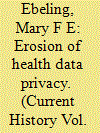

|
|
|
|
|
| Summary/Abstract |
The COVID-19 pandemic has presented lessons on using health data to improve, save, and protect lives, and the need to improve the stewardship of health privacy. Before the pandemic, the United States already had a broken health data system, fragmented and dominated by public-private partnerships in which the businesses involved sought to commercialize patient data. More than two years into the pandemic, in many respects health data privacy is even more fractured and prone to being misused to profiteer and to harm rather than help the most vulnerable. Health data is now being used by law enforcement to criminalize abortion and undocumented immigration, making reform an urgent necessity.
|
|
|
|
|
|
|
|
|
|
|
|
|
|
|
|
| 9 |
ID:
176747


|
|
|
|
|
| Summary/Abstract |
The European Union is implementing ambitious programs to tackle energy efficiency, energy independence, and climate change challenges. To reach the 20/20/20 targets, the EU aims at modernizing power grids to make them ‘smart’ by collecting close to real-time data and subsequently operate grids more optimally. One of the smart grid purposes is to integrate a growing share of renewable generation while efficiently accommodating their variability and limited predictability through the actuation of consumer flexibility. Hence, the success of energy programs relies on customer involvement in altering their energy consumption through the use of analytics and incentive-based demand-side management. The rollout of smart meters throughout Europe should provide the necessary information to implement them. This is without accounting for a possible backlash of customers in response to bad practices of utilities when it comes to digitization and smart meter rollout, also associated with the potential distrust of digital products. Beyond legal binds and technical obstacles, the possible ways of handling the rollout of smart meters and metering, which defines the relationship between customers and utilities, are multiple. However, only the practices that exhibit ethical behavior of the utilities towards customers, and consider them as stakeholders in smart grids will lead to a fruitful and long-lasting relationship between customers and utilities.
|
|
|
|
|
|
|
|
|
|
|
|
|
|
|
|
| 10 |
ID:
163646
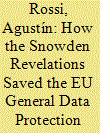

|
|
|
|
|
| Summary/Abstract |
Snowden’s global surveillance revelations inverted the direction of the European Parliament’s debate on the General Data Protection Regulation (GDPR). Before Snowden’s revelations, corporations were shaping Europe’s privacy rules. But when Snowden’s revelations raised the salience of Internet privacy issues, the power of corporations went down, and privacy advocates incorporated their preferences into the GDPR. Thus, the fact that Snowden was able to increase the salience of privacy issues was instrumental in defeating organised corporate power and enabling privacy advocates to mobilise Europe’s culture of privacy protection.
|
|
|
|
|
|
|
|
|
|
|
|
|
|
|
|
| 11 |
ID:
116134


|
|
|
|
|
| Publication |
2012.
|
| Summary/Abstract |
This article discusses the evolving framework of a new branch of international public law - international Internet law (IIL), the public international law framework for Internet governance. The article presents the genesis of IIL, its principles and perspectives; tackles key challenges to this new interdisciplinary area of research, such as cyber-security, jurisdiction and privacy protection; and draws analogies between IIL and such traditional areas of international public law as environmental law, human rights law and law of the sea. The article presents current proposals of applying international environmental law due diligence standard to state responsibility for cyber-attacks and giving critical Internet resources the Common Heritage of Mankind status. The role of soft law in creating IIL is emphasized and successful examples of its exercise are presented. The article then goes on to elaborate on hard-law proposals for IIL (Internet Framework Convention including a unique multistakeholder model of participation and responsibility) and presents them as the further evolutionary path for IIL.
|
|
|
|
|
|
|
|
|
|
|
|
|
|
|
|
| 12 |
ID:
172701


|
|
|
|
|
| Summary/Abstract |
This article explores the politics surrounding the recent data transfer agreement between Japan and the European Union, with a focus on the linkage between Japanese domestic politics and foreign pressure on Japan’s personal information protection policy. The agreement may be seen as one of mutual recognition, in that Japan and the EU mutually recognized the other as providing an “adequate level of protection” for personal data. However, a close examination of the case suggests that Japan made substantial efforts to meet the EU’s standards for adequacy in order to enhance the interests of transnationalized Japanese firms that rely on the flow of personal information across borders. In sum, the latest changes in Japanese personal information protection regulation paved the way for the Japan-EU data transfer agreement; these changes were precipitated by the extraterritorial effect of the EU’s data protection laws, which had resonated within Japan’s domestic politics.
|
|
|
|
|
|
|
|
|
|
|
|
|
|
|
|
| 13 |
ID:
180565


|
|
|
|
|
| Summary/Abstract |
The article examines the role of NGOs in the politicisation of EU security. The focus of the empirical analysis lies on the field of EU counter-terrorism. The cases selected are two different types of legal acts, adopted in the aftermath of serious terrorist attacks in EU member states: The EU data retention directive and the EU passenger name record (PNR) directive. These policies present intrusiveness and relevance for Brussels-based and national civil rights NGOs since they both aim to touch upon individual liberties, like privacy rights or the right to protect personal data. The article goes further by opening up the black box of politicisation. It does so by assuming that politicisation is characterised by a certain level of salience, actor range and polarisation. The paper links politicisation literature to research on the influence of interest groups that are discussing, for example, voice, access or litigation as strategies. Therewith, the paper contributes to the scientific debate on politicisation in two ways: First, it sheds light on the so far disregarded role of NGOs in politicisation. Second, it builds a bridge to interest group literature by examining repertoires of NGOs in politicisation.485-503
|
|
|
|
|
|
|
|
|
|
|
|
|
|
|
|
| 14 |
ID:
130989
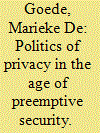

|
|
|
|
|
| Publication |
2014.
|
| Summary/Abstract |
In August 2013, a report was leaked to the Washington Post in which it was revealed that the US National Security Agency (NSA) violated its own privacy rules 2,776 times over a one-year period (Gellman 2013). The privacy violations documented in the report range from technical errors to serious violations such as operations without consent from the Foreign Intelligence and Surveillance (FISA) court and breach of the five-year data retention period. Other breaches are described as "broad syntax" errors, which are related to imprecise queries. This type of fault is presumed reducible "if analysts had more complete and consistent information available about … targets."1 Following the recent disclosures concerning the NSA's PRISM program, which has the capacity to search and connect numerous social network databases in the name of security, the importance of the publication of this privacy report cannot be overestimated. While much of the public discussion concerning PRISM has so far focused on the person of Edward Snowden and his unlikely journeys to Hong Kong and Russia, relatively few questions have been raised about the value and legitimacy of the PRISM program itself. The Washington Post revelations concerning the NSA privacy breaches have grabbed the headlines and may lead to Congressional Hearings (Blake 2013). As with other security and surveillance programs, privacy is a key anchor for critical questioning and public debate
|
|
|
|
|
|
|
|
|
|
|
|
|
|
|
|
| 15 |
ID:
153821


|
|
|
| 16 |
ID:
127923
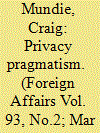

|
|
|
|
|
| Publication |
2014.
|
| Summary/Abstract |
Ever since the Internet became a mass social phenomenon in the 1990s, people have worried about its effects on their privacy. From time to time, a major scandal has erupted, focusing attention on those anxieties; last year's revelations concerning the U.S. National Security Agency's surveillance of electronic communications are only the most recent example. In most cases, the subsequent debate has been about who should be able to collect and store personal data and how they should be able to go about it. When people hear or read about the issue, they tend to worry about who has access to information about their health, their finances, their relationships, and their political activities.
|
|
|
|
|
|
|
|
|
|
|
|
|
|
|
|
| 17 |
ID:
130991


|
|
|
|
|
| Publication |
2014.
|
| Summary/Abstract |
When US President Barack Obama publicly addressed the data mining and analysis activities of the National Security Agency (NSA), he appealed to a familiar sense of the weighing of the countervailing forces of security and privacy. "The people at the NSA don't have an interest in doing anything other than making sure that where we can prevent a terrorist attack, where we can get information ahead of time, we can carry out that critical task," he stated. "Others may have different ideas," he suggested, about the balance between "the information we can get" and the "encroachments on privacy" that might be incurred (Obama 2013). In many ways, conventional calculations of security weigh the probability and likelihood of a future threat on the basis of information gathered on a distribution of events in the past. Obama's sense of a trading-off of security and privacy shares this sense of a calculation of the tolerance for the gathering of data on past events in order to prevent threats in the future. In fact, though, the very NSA programs he is addressing precisely confound the weighing of probable threat, and the conventions of security and privacy that adhere to strict probabilistic reasoning. The contemporary mining and analysis of data for security purposes invites novel forms of inferential reasoning such that even the least probable elements can be incorporated and acted upon. I have elsewhere described these elements of possible associations, links, and threats as "data derivatives" (Amoore 2011) that are decoupled from underlying values and do not meaningfully belong to an identifiable subject. The analysis of data derivatives for security poses significant difficulties for the idea of a data subject with a recognizable body of rights to privacy, to liberty, and to justice.
Consider, for example, two years before the controversies surrounding NSA and the PRISM program, when the US Director of National Intelligence, James Clapper, testified before the joint hearing of committees on the virtues of the algorithmic piecing together of fragments of data:
|
|
|
|
|
|
|
|
|
|
|
|
|
|
|
|
| 18 |
ID:
131522
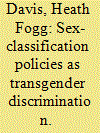

|
|
|
|
|
| Publication |
2014.
|
| Summary/Abstract |
Sex-classification policies are unjust because they prompt and authorize administrative agents to use their own subjective gender judgments to target, inspect, and exclude transgender-appearing people from the public accommodations under their watch. The vast majority of sex-classification policies are not rationally related to legitimate policy goals because there is no objective, socially agreed upon test for determining who is male and who is female, and legitimate policy goals such as fraud prevention, safety, security, and privacy can almost always be met more effectively by alternative means that do not subject people to gender inspection. I make a legal-normative argument for using gender-identity antidiscrimination laws to abolish sex-classification policies. I ground this radical proposal in a modified liberalism that treats sexual self-definition as an integral feature of liberal self-definition. Gender and intersectionality theorists rightly point out the deep structure of race-sex-class perception and oppression, but many of these theorists are too quick to dismiss the radical potential of gender-identity discrimination laws to eliminate, rather than modify, longstanding sex-classification policies. Racial, class and gender perception intersect to generate the possibility, rather than the inevitability, of invidious sex administration. And that is more than enough reason to abandon sex-classification policies.
|
|
|
|
|
|
|
|
|
|
|
|
|
|
|
|
| 19 |
ID:
190003
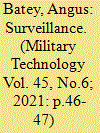

|
|
|
| 20 |
ID:
192082


|
|
|
|
|
| Summary/Abstract |
In the global interconnected economy, China-made information-collecting technologies such as closed-circuit television (CCTV) surveillance cameras have become popular products for routine video-based surveillance. Hikvision and Dahua are the two largest global suppliers of CCTV cameras, with both companies supplying their products to over 200 countries. Despite their popularity, national security concerns are commonly cited when adopting these cameras, citing manufacturer links with the Communist Party of China (CPC), cybersecurity vulnerabilities, and sales recorded in the Xinjiang region, that has records of human rights violations. This paper is structured in three parts: first, we explore the predominance of China-made information-gathering technologies in Australia; second, we summarise common national security concerns usually associated with China-based technology manufacturers; and third, we propose regulatory measures to regulating China-made CCTV cameras in Australia. The paper suggests that while state and Federal decision-makers are free to remove Chinese CCTV surveillance cameras, they should avoid overt politisation. Overall, a stronger focus should be placed on evaluating cybersecurity risks of Internet of Things (IoT) information-collecting technologies and considering their timely and effective regulation from the perspective of individual and national interests.
|
|
|
|
|
|
|
|
|
|
|
|
|
|
|
|
|
|
|
|
|